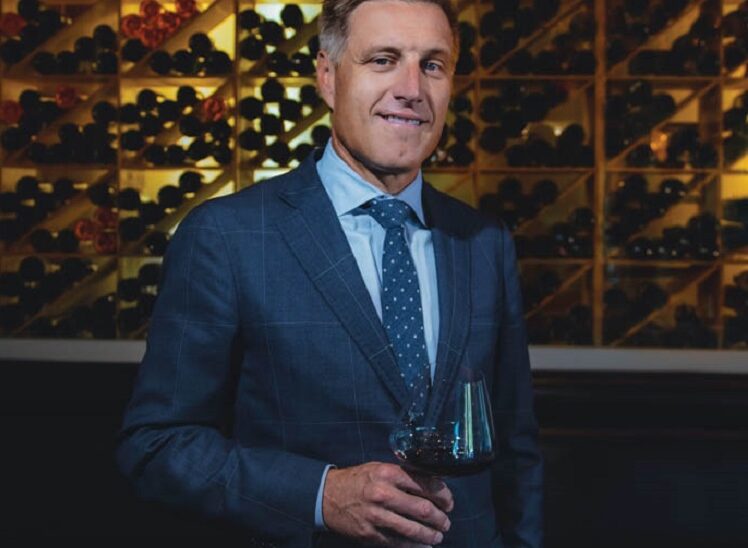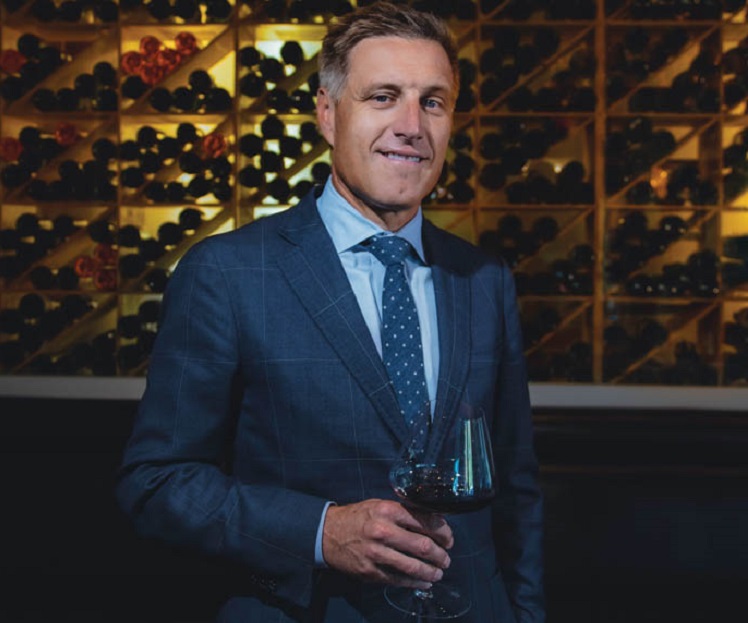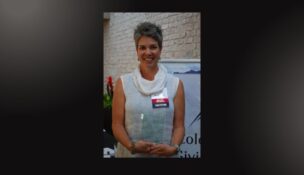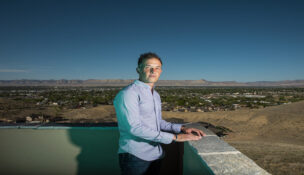Bobby Stuckey’s appetite for restaurant chaos hasn’t dimmed
Good Company: Inside the life and career of the restaurateur and master sommelier
Gabrielle Lyana //November 18, 2019//


Bobby Stuckey’s appetite for restaurant chaos hasn’t dimmed
Good Company: Inside the life and career of the restaurateur and master sommelier
Gabrielle Lyana //November 18, 2019//
Photo by Scott Colby.
Bobby Stuckey, 50 | Restaurateur and master sommelier
Hometown: Phoenix
What he’s reading: “Muhammad Ali: His Life and Times,” by Thomas Hauser
All-time favorite glass of wine: 1985 conterno monfertino
Working the room is a professional pursuit if you’re Bobby Stuckey, the ultimate host. He appears to glide through the dining room each night in one of his three, soon to be four, eateries with ease. But there is a strategy behind every interaction. A “hospitalitarian”— a term coined by famed restaurateur Danny Meyer — describes one whose emotional makeup leads them to derive pleasure from the act of delivering pleasure — which pretty much sums up Stuckey.
ColoradoBiz: How did your early life prepare you for this work?
Bobby Stuckey: My teenage years — I wouldn’t say I was forced into this profession — but it opened me to this profession. A lot has changed in the 30-something years since. In August 1983, I started bussing tables, and I’ll be bussing tables tonight.
I got into the industry because I was a very challenged academic in high school. Got kicked out of Jesuit School — had ADD and was dyslexic. I had to work really hard to be below average.
The chaos of the restaurant business came easy for me. Whereas, my brother is a genius, and he’s not in the restaurant business. He tried bussing tables and said, ‘This is the most maddening thing I’ve ever seen.’ That brought a lot of clarity to me.
CB: Could you have seen yourself doing anything else professionally?
BS: I thought there was a moment that I could be a pro cyclist. I was on the domestic pro team, and a smart guy told me, ‘Don’t quit your night job waiting tables. Unless you’re racing on a pro team in Europe, it’s still a hobby…’ I was a 23-year-old kid at the time, and I was so offended. I had a pro domestic contract, and he said, ‘If you don’t have a 401(k) or enough to pay a mortgage, it’s a hobby.’ I realized, I guess I don’t have those things.
CB: You stay exclusively in the front of the house. Why?
BS: I love taking care of people.
CB: How did you find your way to wine?
BS: Living in Arizona, there wasn’t a codified way to go from A to B in our restaurant. We had a progressive wine program and did wine classes, and I just loved it.
What better way to touch guests than to be better at wine as a server? This was before the movie “Som.” I didn’t know what it meant to be a som. But I showed up to class every week and was helping with inventory. One day, the manager brought a brochure — there was no website – and said if anyone wants to do this class in San Francisco, there’s an opportunity for an intro-level class. Four of us signed up for it. We studied all year together. It was a real bonding experience. It made us better servers. Since we didn’t have a critical path in our industry, this felt like one.
CB: And this brought you to Colorado?
BS: Yeah, I ended up having to move to Aspen for an assistant position at the Little Nell hotel. It was a world-renowned hotel at the time, and [they] were pushing a big wine program. It was a real growth experience.
CB: There are only 229 master sommeliers in the world and you are No. 57. How long did it take you to earn your master som?
BS: It took me 10 years door-to-door from my intro to my masters. I probably could have gotten it done in seven to eight years, but it took me 10.
I think that’s something that’s tough nowadays. I don’t think of that as a long time period. But now, if I tell a 28-year-old this is going to take 10 years, man, it’s like I might get a call from HR saying, ‘Bobby isn’t being nice.’
Nowadays, people want things immediately. But this takes a lot of repetition.
CB: What’s something people don’t realize about the restaurant industry?
BS: There are certain professions that are just going to have different restrictions on your life that aren’t in sync with what society wants to be doing. If you’re an ER surgeon, chances are, you don’t get to work from home. In restaurants, you work weekends. It’s not the same flexibility as if you work for a creative design firm.
CB: Does that ever get to you?
BS: I don’t think about it, but I try to think about it for my employees. I try to be empathetic. The thing that’s tough about the restaurant industry is that someone in your solar system, whether it be a boyfriend, a girlfriend, a wife, a mother-in-law, a best friend, someone is not going to like what you do, and definitely not going to like your hours. But that’s just part of it.
CB: Talk a little bit about the status of your business.
BS: I have two partners, Peter Hoglund and Lachlan Mackinnon-Patterson. For a while, I was a selfish leader. I was really anti-growth in the first solid seven years. I did not want to have other restaurants, so I was putting a cap on how my employees could grow. I wanted a one-off restaurant.
Now, we have Frasca, Pizzeria Locale, a 2.0 joint venture with Chipotle, Tavernetta, and Sunday Vinyl is coming. We just have so many great people in the company. Now, we can build teams to build fun restaurants.
CB: How did you change your mind?
BS: That’s the thing about partnership — you do things you’re uncomfortable with.
CB: What are the benefits and downsides of building a restaurant in Colorado?
BS: Denver and Boulder want world-class dining. We want to be in the vernacular of Chicago, New York City. No one is saying we just want to go back to being a cow town. We want to be great.
I feel now like Colorado’s more home than Arizona ever felt for me. At the Little Nell in my mid-20s, I met my wife, Danette. We moved to Napa for the French Laundry, and when we wanted to open our own restaurant, we didn’t know the Denver-Boulder scene. Man, it’s been great.
There are unique challenges here. The business model in Boulder — there (are) challenges. It’s a city that has very high occupancy costs, rents are very high. With a city that doesn’t really embrace growth of jobs and people, if you choose to open up shop here, you’re living on a different edge than the rest of the world.
CB: The economy has been pretty good in Colorado and beyond recently. What about downturns in your line of work?
BS: They’re frightening times. Everyone told you to get out of fine dining when the Great Recession hit. As much as I don’t want to go back there, Colorado moved out of it much quicker than other parts of the country and the world. It was a different hiring deal, too. People were more than happy to roll up their sleeves.
CB: Talk about your latest project, Sunday Vinyl.
BS: We came up with the concept in March 2018. Our inspiration was for the great wine bars of Europe. We’ll have a full-blown menu. Great music. Sunday Vinyl — the name came from me and my wife’s tradition of drinking wine and listening to vinyl on my only day off each week.
Gabrielle Lyana is a Denver-based writer.

























